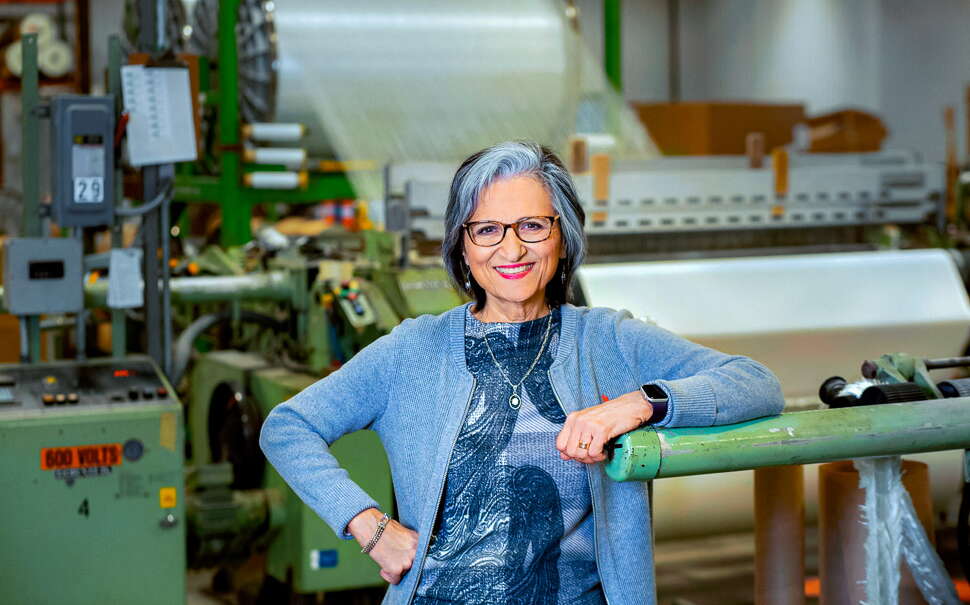
Maine manufacturers brace for potential tariff turmoil
 Photo illustration / Matt Selva — Photo / Tim Greenway
Maine’s manufacturing sector represents 10% of the state’s GDP and 63% of exports, according to the Manufacturers Association of Maine.
Photo illustration / Matt Selva — Photo / Tim Greenway
Maine’s manufacturing sector represents 10% of the state’s GDP and 63% of exports, according to the Manufacturers Association of Maine.
Maine manufacturers from craft beverage makers to industrial suppliers are bracing for disruptions from President-elect Donald Trump’s declaration of war against imports from China, Mexico and even Canada — the state’s largest trade and investment partner.
Trump threatened a blanket 60% tariff against China during the campaign, upping that by 10% after winning the election on a platform to put “America first.” He added 25% tariffs on Mexico and Canada over illegal immigration and drugs to the playbook, which would flout a regional trade accord that he negotiated during his first term. The arsenal also includes 100% tariffs on the nine-nation bloc of BRICS countries (including China) should they create a currency to rival the U.S. dollar.
But in his cabinet selections, the president-elect sent mixed signals. While there are trade hawks on the team, Trump picked a hedge fund manager wary of across-the-board tariffs as Treasury secretary and an old-school internationalist to run the White House economic council. Those rivals are likely to duke it out over policy.
While it’s impossible to predict whose prices will go up and whose exports will go down if Trump makes good on his threats and countries retaliate with taxes on U.S. goods, Maine manufacturers — even ones with diversified supply chains — know it won’t be business as usual over the next four years.
Take Three of Strong Spirits, a small Portland distillery with a growing line of ready-to-drink canned cocktails that obtains all of its materials from U.S. suppliers. However, since the business buys cans from a vendor in St. Louis that gets aluminum from China, co-founder Dave McConnell is bracing for higher costs if tariffs are raised.
He also fears stiffer prices for other materials, as happened during the pandemic when other distilleries which couldn’t get glass from China “sucked up all the domestic glass,” putting small producers like his at a disadvantage.
“Subsequently, those distributors went back to buying from China, but I worry that kind of knock-on disruption is going to both reduce our availability [of supplies] and drive up costs,” says McConnell, whose business is staffed by eight full-time employees and six or seven part-timers. “Tariffs are such an 18th or 19th century tool to apply in a global economy. It just seems nonsensical to me.”
Larger manufacturers on alert
No matter what happens under Trump, larger manufacturers are also bracing for a bumpy ride.
They include Auburn Manufacturing Inc., a Mechanic Falls-based maker of high-performance textiles for extreme temperature protection which relies on exports for 20% of sales. Compared to last year, exports are up 35%.
While the company does not import any raw materials directly, some originate in other countries. For starters, Kathie Leonard, Auburn Manufacturing’s president and CEO, has questions about U.S. dealers stockpiling Chinese products similar to her company’s, which would “hurt our sales in the short term.”
However, she adds, “my main concern is the threatened Trump tariffs on imports from our good neighbors, such as Canada and Mexico,” the company’s biggest export markets.
“If that happens, their governments may retaliate by raising tariffs on U.S. products like ours,” Leonard warns. “That would force our export customers to buy from our competitors offshore, like China.”
Despite two anti-dumping victories against China under her belt, Leonard is unsure what else U.S. companies can do to stop the importation of heavily subsidized goods from China or elsewhere without incentives from Washington to cover the legal costs of filing such actions.
“Without such incentives, few companies have the resources to go it alone,” she says. “That’s what led U.S. manufacturers to offshore their production in the first place.”

Elsewhere in Maine, Puritan Medical Products is a Guilford-based maker of swabs for medical and research uses with around 450 employees.

The family-owned firm, which closed its Tennessee factory last year in a major restructuring, has added 100 employees this year and is seeking to fill another 50 openings, in Guilford and Pittsfield, according to Robert Shultz, the company’s president and CFO. He says that Puritan sources less than 10% of its raw materials from other countries and sells mainly in the United States, which accounts for 80% to 85% of sales.
With factory orders up this year, Shultz wonders what will happen if Trump’s tariffs are implemented and achieve their intended goal of promoting sales of American-made goods.
“How are companies going to meet that demand if everyone is already constrained with employees?” he says. “We will need a scenario plan.”

The head of another large Maine manufacturer, who declined to be named, is already considering a grimmer scenario: “When you start getting threats of tariffs of anywhere between 10% to 60% on every good coming into this country, it creates another level of uncertainty that’s harder to deal with,” he says. “We’ve been contemplating building a new factory here in Maine and this uncertainty is going to cause us to probably slow that down.”
Brad Williams, a North Berwick-based project manager with Pratt & Whitney, is less rattled about any potential fallout for the aerospace manufacturer, whose clients include the U.S. government. But as a multinational company with parts used by commercial airlines around the globe, “I’m sure we’ll feel it in that area.”
“We don’t really spend time hedging for things like tariffs, because our budget cycles are fairly predictable,” he adds.
A sector in flux
While the use of tariffs in this country dates back to the colonial era, the most notorious example was the Smoot-Hawley Tariff signed by President Herbert Hoover in 1930 that imposed import taxes on 20,000 imported goods — a move widely seen by economic historians as deepening the Great Depression.
Fast forward to Trump’s first term in office, when his administration imposed tariffs on China and other parts of the world and on products including solar panels, washing machines, steel and aluminum. Trading partners fought back with taxes on U.S. imports, resulting in higher prices for manufacturers — and consumers. (The Biden administration kept the tariffs on Chinese imports, as well as the U.S.-Mexico-Canada Free Trade Agreement.)

If implemented, Trump’s new tariffs — targeting countries rather than individual products or industries — could spell similar trouble for American companies, says Amir Mousavian, an associate dean and professor of supply chain management at the University of New England College of Business.
“For manufacturers, including those in Maine who rely on raw materials, equipment or components from these countries, the result will likely be a significant increase in the cost of supplies,” hitting smaller businesses the hardest.
“This could lead to reduced profitability, layoffs or even closures as these businesses simply cannot keep up with the cost pressures or the competition from larger, more resource-rich businesses,” he cautions.
Small businesses make up the bulk of Maine’s $6.8 billion manufacturing sector, which accounts for 10% of the state’s GDP and 63% of its exports. Out of nearly 1,900 manufacturers statewide, fewer than 200 have more than 20 employees.
Despite pandemic disruptions, the sector has been on an upswing, adding nearly 3,500 jobs over the last five years, according to a May 2023 report by the state Department of Economic and Community Development. The sector employed close to 57,000 people, around 8% of the state’s total, in 2022.
At the time, the agency projected the addition of another 1,400 jobs between 2022 and 2027, led by Maine producers of chemicals, pharmaceuticals and medical equipment, transportation and beverages.
As new trade wars loom, Mousavian says that one short-term solution for companies is to stockpile raw materials, finished goods or key components to create a buffer against immediate disruptions though that also ties up capital and incurs additional inventory holding costs.
Proactive companies may already have started to hedge their bets by finding alternative suppliers on American soil or in non-tariffed countries, while another strategy is to renegotiate better pricing terms with suppliers in affected countries. Neither is an easy task, especially for businesses that can’t quickly reorient their supply chains, he says: “If they had the ability to make swift adjustments, they would likely be less worried about the potential disruptions caused by tariffs.”
Trouble brews for brewers
Tariff-related turbulence goes well beyond Maine, particularly for the nation’s 9,900 small and independent craft brewers.
While beer made by members of the national Brewers Association can only be produced in this country, “that doesn’t insulate the industry from tariffs,” the Boulder, Colo.-based trade group has warned.
One potential trouble spot is malted barley, which requires a temperate climate with cool, dry weather in places like Canada. Another is aluminum, which has been subject to a tariff since 2018 although with an exemption for Canada. Even with the exemption, the cost of aluminum cans has risen since the initial tariffs took effect, so a 25% tariff on Canadian aluminum would likely further increase the cost of cans for small producers, the group warned. Other materials used for brewing, like bottle caps imported from Mexico and equipment or parts from other countries, could also be affected by new tariffs.
As queries start to come in from concerned members, “we’re filling them in with information on where supplies come from so that those who have opportunities to build security now can think about ways to do that,” says Bart Watson, the organization’s chief economist.
The Maine Brewers’ Guild is also watching closely as some of its members fret about higher costs if new tariffs are imposed.
“We go through millions of cans a year, so if the price of aluminum went up, that would certainly impact our pricing,” says Abe Furth, co-owner of Orono Brewing Co., which employs around 40 people including 15 in production. The company buys from a domestic supplier that gets aluminum from overseas, he says.
Because Orono Brewing also has a lot of equipment from Asia, new tariffs “would definitely be a concern if we were building out a brewery right now,” he says
Baxter Brewing Co. in Lewiston also sees some red flags ahead. “From Baxter’s perspective the proposed tariff structure will likely impact the cost of cans again as they did in Trump’s last administration,” says Jenn Lever, the company’s president.
Another looming hurdle: “With our malt being primarily Canadian this could also have a huge impact on cost and availability depending on what Canada imposes back to the U.S. as well,” Lever says.
Wall Street and waiting game
While some economists have voiced concerns that tax cuts and higher tariffs under Trump could trigger higher inflation, interest rates in the bond market have gone back below pre-election levels and Wall Street investors have pushed the S&P 500 stock market index to new records. But Trump’s tariff threats remain a wild card.
“The thing that businesses abhor above everything else is uncertainty,” says Mike Roughton, executive director of the Manufacturers Association of Maine, a 200-strong nonprofit trade group. While Trumps vaunts his unpredictability, the result is “churn and chaos” for businesses, he says. Roughton has experienced that firsthand, running a metal stamping business in New Jersey the last time Trump was in office and imposed steel and aluminum tariffs.
In a world where supply chains were thrown out of whack during the pandemic and hiring remains difficult, companies’ ability to respond to changing conditions is constrained, Roughton notes. Add tough trade talk and new tariffs to the mix, “and it distracts them from what they are supposed to be doing, which is making great products for their customers and keeping them happy.”

Editor's note: Article updated to clarify the proportion of raw materials that Puritan sources from other countries.














0 Comments